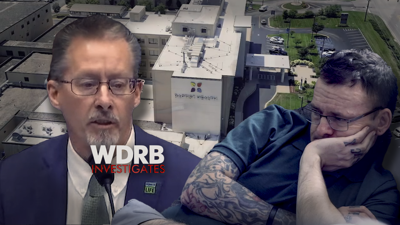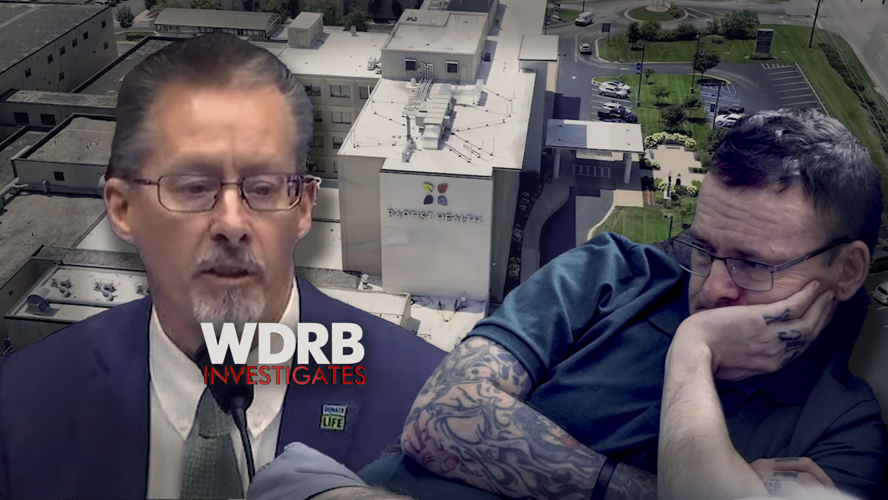LOUISVILLE, Ky. (WDRB) -- TJ Hoover was moments away from having his organs removed for donation when something extraordinary happened: He opened his eyes.
Medical records say Hoover had been declared brain dead in 2021 and was being prepared for organ donation when he regained consciousness — a stunning turn that has sparked a federal investigation and raised serious questions about the organ donation process.
"Almost immediately during his honor walk, his eyes started opening," said Donna Rhorer, Hoover's sister. "... and not only open — they were tracking."
Documents obtained by WDRB Investigates show the Health Resources and Services Administration identified issues with medical assessments, family communication and the recognition of neurological activity during Hoover's case. The agency concluded there was a "potentially serious and ongoing risk to patients and families."
At the time, the donation process was overseen by Kentucky Organ Donor Affiliates, which has since merged Lifecenter Organ Donor Network and is called Network for Hope. The newly formed organization now coordinates organ donation across Kentucky, Indiana, Ohio and West Virginia.
Barry Massa, CEO of the Network for Hope, wasn't with KODA when Hoover's case occurred but acknowledged the damage it has caused to public trust. While Hoover's family says they were told he was declared brain dead, Network for Hope says, "Mr. Hoover was never declared brain dead. Mr. Hoover was being followed as a potential candidate for DCD donation which is different." Network for Hope also says "Mr. Hoover was not in the process of getting his organs removed. Organ recovery never occurred because Mr. Hoover was never pronounced dead."
"The public trust in the donation system and transplant system has definitely reduced because of this," Massa said. "What we're trying to do is just tell them how safe donation really is."
Massa said changes have been made to the process of donation after cardiac death, known as DCD, including improved communication among medical teams and "hard stops" at key steps in the process.
Still, Massa said public concern remains high. Since Hoover's story gained national attention last year, Network for Hope reported about 1,000 people removed themselves from the organ donor registry by October 2024. Massa said that number has again declined in recent months as the case re-entered the news cycle.
"This is a story that's more for a horror movie than a Congressional hearing, frankly," said Rep. Neal Dunn, R-Fla., during a hearing on Capitol Hill last month.
Lawmakers questioned whether current organ donation protocols are safe and ethical. Rep. Gary Palmer, R-Ala., voiced alarm over the timeline of events in Hoover's case.
"If a patient is dying ... but take the patient's organs before they die — that's euthanasia," Palmer said.
Massa, who was called to testify, emphasized that organ procurement organizations like Network for Hope do not declare death or administer sedation.
"That is done by a physician," he said. "We don't do anything with sedation, medication or anything like that."
He also tried to dispel common myths about organ donation.
"That is by far the biggest myth, when it comes to donation — that if I'm registered, they're not going to save my life," Massa said. "When you go to the emergency room, they're not looking at your license to see if you're registered. The hospital doesn't have the ability to go into the registry system to see if you're registered."
Hoover's family continues to push for stronger safeguards to prevent similar mistakes.
"Our fight is to make sure this doesn't happen to another family," Rhorer told WDRB in a previous interview.
Although Hoover continues to face serious health challenges, his family remains grateful.
"I'm glad he's alive. I'm glad it worked out," Massa said. "I'm glad Mr. Hoover was able to still have a life."
For more information on Network for Hope, click here.
Related Stories:
Kentucky man woke up just before organ removal surgery, sparking federal investigation
Copyright 2025 WDRB Media. All Rights Reserved.














